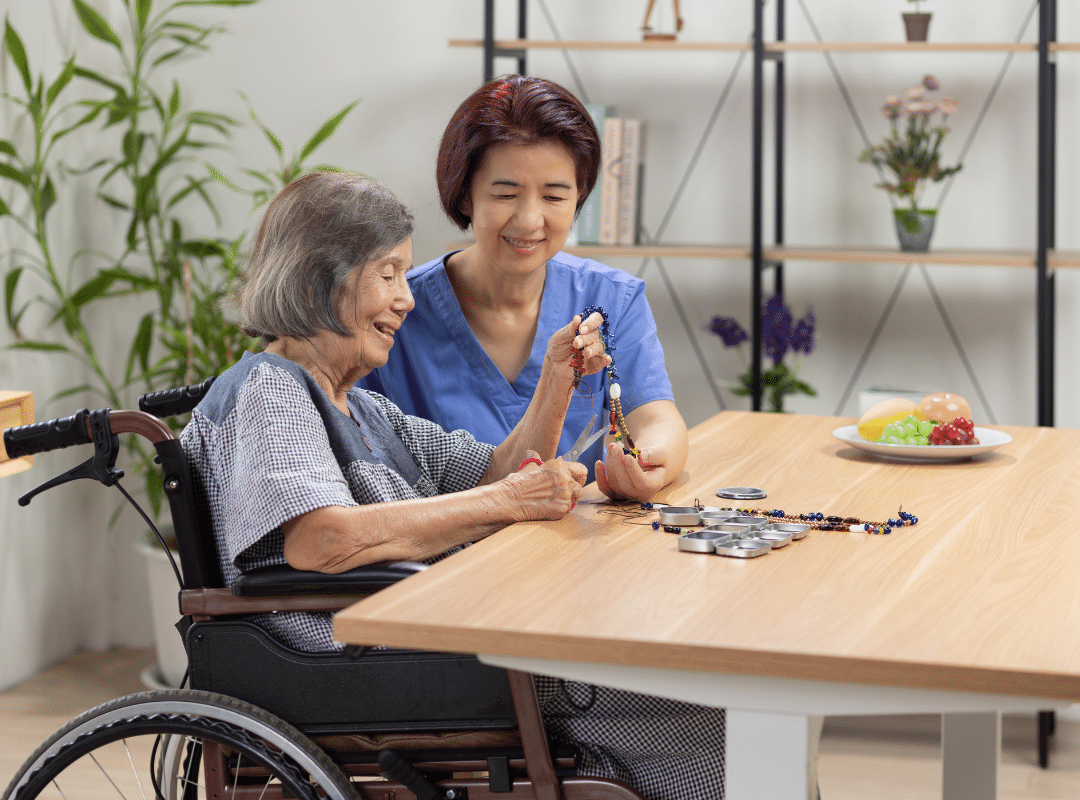Engaging in memory games for dementia patients isn’t just a source of entertainment—it’s a powerful way to stimulate the brain, promote emotional well-being, and build connections. At Heritage Manor Assisted Living, incorporating these activities into the daily routine helps residents remain mentally active and feel more engaged in their surroundings. Games provide both mental stimulation and joyful interaction, which are key components in enhancing the lives of individuals living with dementia.
From simple games for dementia patients to more strategic board and word games, the goal is to keep the brain active and the heart full. Whether you’re a caregiver or a family member, these games can become meaningful rituals that create cherished moments. And with so many free memory games for dementia available—both physical and digital—it’s easier than ever to find the right match for each individual’s needs and abilities.
Why Memory Games Matter in Dementia Care
Games are more than pastimes—they are tools for cognitive enrichment. For patients with dementia, engaging the brain regularly through games can support memory retention, emotional expression, and a sense of accomplishment. Especially when patients are introduced to memory games for dementia online or app-based activities, the accessibility and variety make a major difference in day-to-day care. Games such as crosswords, puzzles, and dice games engage different parts of the brain, providing residents with opportunities to think critically, recall information, and remain socially engaged.
Incorporating a wide variety of simple games for dementia patients also promotes flexibility and personalization in care routines. At Heritage Manor, these games are seen not just as entertainment but as essential exercises in dignity, joy, and mental wellness. Learn more about how we support independence and engagement through memory care.
Word Games: Powering Language and Recall
Word games remain one of the best tools for improving focus and stimulating vocabulary in seniors. From daily crosswords to casual word searches, these activities are effective and enjoyable memory games for dementia patients.
Crosswords That Engage
Crosswords challenge long-term and short-term memory, pushing participants to recall vocabulary and learn new words. These puzzles are perfect examples of free memory games for dementia that can be printed from online resources or completed together in the newspaper. Doing them with others helps foster social interaction, which itself can contribute to cognitive resilience. Explore more brain-boosting games that reinforce memory and mental agility.
Word Searches for Fun Focus
Word searches are excellent, simple games for dementia patients, especially when themed around familiar topics like animals, holidays, or family. These puzzles help trigger memory, increase attention span, and create opportunities for joyful achievement. Plus, many platforms offer memory games for dementia online, making word searches one of the most flexible options.
Anagrams for Creativity
Playing with anagrams introduces new ways to explore words and meanings. They can start off easy and become more complex over time, allowing room for confidence-building and skill development. This also fits well into the growing selection of free dementia games apps, which include interactive versions of anagrams to keep users engaged on tablets or phones.
Jigsaw Puzzles: A Picture of Success
Jigsaw puzzles are a beloved classic, and for good reason. They require hand-eye coordination, shape recognition, and long-term focus—all while offering a tangible sense of accomplishment. The best puzzles for dementia are those with large pieces and familiar imagery. These are ideal memory games for dementia patients, as they balance challenge with comfort.
Puzzle time can also be social, creating opportunities for group play or caregiver participation. The process of completing a picture together can be both calming and rewarding. As highlighted in our care philosophy, meaningful engagement is at the heart of successful memory support.

Dice Games That Make Math and Memory Fun
Dice games encourage counting, pattern recognition, and decision-making. These are great, simple games for dementia patients because the rules are often easy to learn and modify based on ability.
Classic Dice Games
Games like Yahtzee, Bunco, or custom games using color-coded dice are popular choices. They support mental stimulation while being easily adaptable to a range of cognitive levels. For those seeking free memory games for dementia, printable score sheets and simple dice rules make this activity widely accessible.
Tips for Engaging Play
To ensure these games remain fun and beneficial, it’s important to:
- Use large, easy-to-read dice
- Keep score with visuals or symbols
- Limit game duration to 15-20 minutes
- Encourage group participation
- Celebrate each player’s progress
These strategies make dice games enjoyable, empowering, and effective memory games for dementia patients.
Cards That Encourage Strategy and Connection
Playing cards offer both social engagement and strategic challenge. Games like Uno, Go Fish, or modified Memory are easy, free memory games for dementia that work well for small groups. For more cognitive benefit, try sequencing games like Crazy Eights or even pairing games like Concentration.
Simplifying the Setup
For patients with dementia, consider using cards with larger print and fewer suits. Keep the game familiar, but flexible. These simple games for dementia patients also encourage hand-eye coordination and can be played with caregivers, friends, or family.
Board Games: Classic Choices with Modern Impact
Board games are a rich resource for memory games for dementia patients because they combine visual, strategic, and emotional engagement. When chosen carefully, they offer both structure and creativity.
Examples of Great Games
- Scrabble: Supports vocabulary and memory recall.
- Connect Four: Helps with planning and pattern recognition.
- Rummikub: Combines numbers and decision-making.
- Checkers: Offers a structured and familiar activity.
- Dominoes: Easy to understand and satisfying to complete.
These board games offer varied difficulty levels and can be adjusted for player ability, making them ideal for any stage of dementia care.
Going Digital: Apps and Online Games
Technology brings more options than ever. Today’s tablets and smartphones offer access to free dementia games apps and memory games for dementia online. Apps like Lumosity, MindMate, and Let’s Play Memory are designed with cognitive engagement in mind and often include adaptive features for aging users.
Benefits of Digital Games
- Portability and ease of access
- Audio and visual cues for guidance
- Interactive formats for increased attention
- Trackable progress to show improvement
These tools are a fantastic way to supplement traditional games and allow seniors to engage on their own time. For more tools, check out Caring.com’s list of memory games for dementia and Verywell Health’s brain game recommendations.
A Game Plan for Joy and Memory
At Heritage Manor Assisted Living, incorporating memory games for dementia patients is more than a daily activity—it’s a commitment to dignity, happiness, and cognitive care. Whether you’re opting for a quiet jigsaw puzzle, a lively game of dice, or exploring free dementia games apps, each moment of engagement matters. These games not only fight cognitive decline but also invite laughter, friendship, and purpose.
If you’re ready to explore how memory games can be part of your loved one’s care journey, or if you want to learn more about our supportive community, contact us or call (520) 818-2488 today.
Frequently Asked Questions
What games are good for dementia patients?
Games that are simple, familiar, and low-stress work best for dementia patients. Card games like Go Fish, large-piece puzzles, and matching games can help with memory and recognition. Games that involve sorting, like color or shape matching, also stimulate the brain without overwhelming it. These activities provide enjoyment while supporting cognitive engagement.
How to calm an agitated dementia patient?
To calm an agitated dementia patient, speak in a calm, reassuring tone and reduce environmental stressors like loud noise or bright lights. Offer comfort through gentle touch or familiar music, which can soothe anxiety. Redirecting their attention to a peaceful activity, like looking at photos or folding laundry, can help them relax. Most importantly, remain patient and supportive throughout the interaction.
What are some enjoyable activities for individuals with dementia?
Fun activities for individuals with dementia include listening to music, gardening, arts and crafts, and gentle physical exercises. These activities provide sensory stimulation and encourage emotional expression. Reminiscence activities, such as looking at old photos or sharing stories, can also spark joy and connection. Tailor activities to the person’s interests and abilities to keep them engaged.
Can memory games help dementia?
Memory games can help dementia patients by stimulating brain activity and encouraging focus and recall. While they do not stop the progression of dementia, they may help slow cognitive decline and improve quality of life. Simple games like matching pairs, trivia, or word recall can be enjoyable and mentally engaging. Consistency and positive reinforcement make these games more effective.


